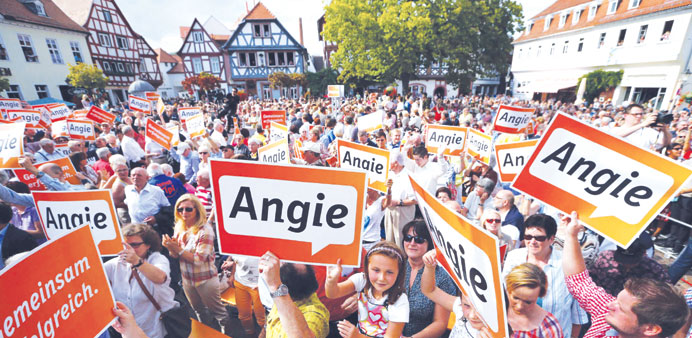Supporters of Merkel hold up placards during a campaign rally in Seligenstadt near Frankfurt yesterday.
Reuters/Seligenstadt, Germany
Chancellor Angela Merkel launched her re-election campaign yesterday by presenting herself to voters in this mediaeval town in the heart of Germany as a safe pair of hands who would steer the country through crisis and ensure continued prosperity.
Returning from a three-week summer vacation, Merkel spoke to about 1,000 people who packed into the town square, some waving “Angie” signs but others from the youth wing of the rival Social Democrats trying to spoil the mood with chants of “Merkel out!”
With five weeks to go until election day, Merkel’s conservatives hold a comfortable 15-point lead over the Social Democrats (SPD). That virtually ensures she will win a third term on September 22, an achievement equal to only two previous post-war German leaders – Konrad Adenauer and Helmut Kohl.
But she is in a fight to preserve her centre-right majority with the business-friendly Free Democrats (FDP). If she falls short, she will be forced into difficult coalition negotiations with the SPD or, failing that, the environmentalist Greens.
Not known as a stirring speaker, Merkel offered little new in her 25-minute address.
She hailed the decline in unemployment since she became chancellor in 2005 and borrowed a page out of late US president Ronald Reagan’s book in asking voters to ask themselves: “Are you better off than you were eight years ago?”
But she coupled that with a subtle warning that the prosperity Germany has enjoyed through five years of eurozone financial crisis would be at risk if the SPD or Greens were to take power.
“When someone is successful the first thing the SPD and Greens ask is what can be taken away from them,” said Merkel, dressed in a raspberry-coloured blazer. “Germany is in a good position today. But if we don’t make progress we can very quickly run into situation where other countries pass us by.”
Germany’s first woman chancellor and the first to have grown up in the formerly communist East, Merkel is the country’s most popular politician, held in high esteem for her modest style and steady leadership, especially during the eurozone crisis.
“She didn’t say anything new today. But it was an honest speech. There is no one better than her,” Edgar Bihn, a 75-year-old pensioner from nearby Weiskirchen and long-time supporter of her Christian Democrats (CDU), said after listening to Merkel.
Critics, including her SPD rival for the chancellery Peer Steinbrueck, accuse Merkel of lacking vision and “lulling the country to sleep” with empty, reassuring phrases.
Her speech was littered with these: “We want to help to make your dreams come true and not tell you what to do with your life.”
Asked what he thought of Merkel, Jannis Holl, a 19-year-old SPD supporter who heckled her during the speech, said: “As a mother or grandmother she’s great. But I want a chancellor.”
Merkel chose Seligenstadt, a town which traces its origins to a fortress built by the Romans in 100 AD, because it sits on the border of Hesse and Bavaria, two conservative-governed states that will hold regional elections next month.
As she spoke, people gazed down from the tiny windows of mediaeval half-timber houses. A traditional May Pole towered over the middle of the square.
In her eight years as chancellor, Merkel has shifted her party to the left, co-opting many of the policies of her rivals.
She is pulling Germany out of nuclear power and now advocates a minimum wage – positions she argued against several years ago.
In keeping with her nature, the chancellor is running a cautious, risk-averse campaign.
Her election posters include vague phrases like “Successful Together”, “More for Families” and “Strong Economy”.
As a result, she has been criticised for skirting the issues.
This week, the SPD accused her of lying to voters about the risk that Germany will have to offer Greece another financial rescue after the election.
In an unusual foray into domestic politics several weeks ago, German President Joachim Gauck criticised politicians for failing to be clear with voters about policy differences.
“Those (politicians) that avoid clarity today are creating the non-voters of tomorrow,” he said.

